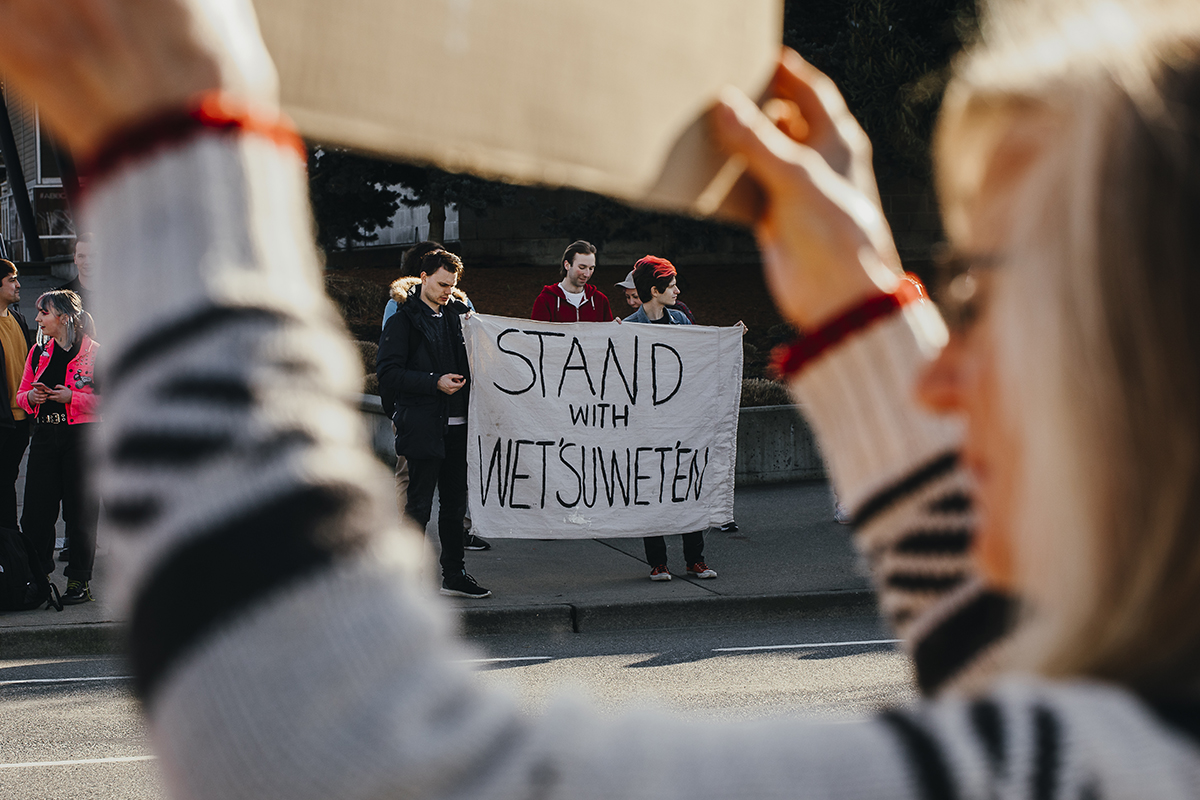Around 30 UFV students and community members gathered in solidarity with Wet’suwet’en protesters Wednesday.
The demonstration took place at the corner of University Way and King Road on March 4, after students marched down McKenzie Road from UFV. The goal was both to show support and bring visibility to the ongoing conversation around the Wet’suwet’en anti-pipeline protests.
“We’re letting people know that what’s happening is very wrong,” Willow Dennison-Hardy, one of the event coordinators and a UFV student, said.
At the time of the demonstrations, a possible agreement had been reached between the Wet’suwet’en hereditary chiefs and the B.C. and federal governments around land rights and systems of governance. Dennison-Hardy said that despite the negotiations, the demonstrations would continue until the hereditary chiefs end their protest.
“Because of the talks that the hereditary chiefs have been having right now with the government, I think people think that it’s over, and it’s definitely not over,” Dennison-Hardy said. “And until the hereditary chiefs tell us to stop, we shouldn’t be stopping.”
The UFV walkout coordinated with student walkouts that occurred across Canada, including at Simon Fraser University, Capilano University, UBC, Camosun, and Langara College in B.C. The protestors at UFV were non-disruptive; demonstrators held signs with phrases such as “No pipelines on sovereign land” and “RCMP off Wet’suwet’en territory,” and waved to passing cars.
Adrian Rain Flinn-Neeposh, a UFV student and member of the Cree Nation of Mistissini, was involved with protesting the Kinder Morgan Trans Mountain pipeline expansion and helped lead the Feb. 21 demonstration in downtown Abbotsford.
Flinn-Neeposh said he supports smaller demonstrations like the UFV walkout, as it shows people within the community are actively engaged in issues. They show that communities around Canada are watching and acting as witness to the injustices to the Wet’suwet’en.
“When people get comfortable with the status quo, then it’s easier for them to just let injustice slip on by … so showing that people are engaged with what’s happening in our country is important,” Flinn-Neeposh said.
While the recent demonstration was held to show solidarity with the Wet’suwet’en hereditary chiefs, a number of signs also held anti-pipeline messages. Dennison-Hardy said this is not surprising; the two issues are connected, and many of those who have been watching the anti-pipeline movements are the same people who are paying attention to other social issues within the community.
“In small conservative towns like this there are only so many people paying attention. So yes, you’re going to see some of the same people because we’re the people that are paying attention,” Dennison-Hardy.
Dennison-Hardy said that there have been mixed reactions to the demonstrations. In public the worst has generally been limited to glares or obscene gestures, but on social media the protestors have received threats, even those engaging in non-disruptive protests.
There have been positive reactions as well; Dennison-Hardy has received private messages over social media expressing support from people who were not able to participate themselves.
“I have had people say some really kind things to me and be really supportive,” Dennison-Hardy said. “[They] let me know that they can’t do it, but they’re glad to see some people are.”
Image: Sean Dalin


